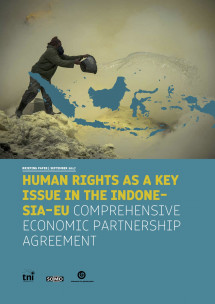Human Rights as a Key Issue in the Indonesia-EU Comprehensive Economic Partnership Agreement
Topics
This paper explores the potential impacts of an Indonesia-EU CEPA on human rights in Indonesia and the state’s duty to protect human rights.

Downloads
Authors
In April 2016, the European Union (EU) and Indonesia announced their intention to conclude an EU-Indonesia Comprehensive Economic Partnership Agreement (CEPA). Negotiations were officially launched in September 2016.
Modern trade and investment agreements like the CEPA can impact deeply on domestic policies and conflict with wider human rights obligations and the duty to protect the environment.
The CEPA negotiations deal not only with at-the-border trade in goods, but also with market access for European service providers and extensive liberalisation and protection of European investors in the Indonesian economy.
Liberalisation of services will enhance commercialisation and opportunities for cherry-picking by foreign service providers focusing on wealthy consumers in concentrated markets. This threatens to conflict with universal and affordable access to basic public services, including in poorer, outlying regions in Indonesia.
The extensive protection of foreign investor rights routinely included in the EU’s free are enforceable through a binding investor-state dispute settlement mechanism, which allows transnational corporations to unilaterally sue sovereign states before an international investment tribunal if government measures threaten to impact negatively on the returns on their investment. As awards can run into hundreds of millions of dollars, even the threat of claims can ‘persuade’ governments to retract or water down contested measures. The proposed inclusion of an investment chapter in the CEPA threatens public authorities’ freedom to regulate in the wider public interest.
The report has a special focus on the EU’s interest in ‘sustainable access’ to raw materials in the CEPA. The EU is demanding that Indonesia weakens regulation (such as export taxes, etc.) related to energy and raw materials. Indonesia is using such measures as part of its policy to boost domestic development. Foreign investors have already used (the threat of) multi-million dollar investment claims to ‘persuade’ Indonesia to water down or shelve proposed measures. As an overarching problem, economic activities in the raw materials sector are frequently linked to human rights violations.
To ensure a draft agreement will not lead to incompatibility with pre-existing human rights obligations, the CEPA negotiations should be based on a human rights impact assessment (HRIA). The human rights and environmental impacts on CEPA should also be periodically assessed ex post, leading to amendments of the agreement if there are negative outcomes.

